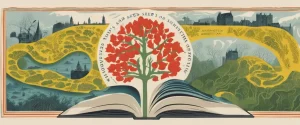——Antifragile by Nassim Nicholas Taleb & Thinking in Bets by Annie Duke
In an ever-changing world filled with uncertainty and unpredictability, human beings continuously strive to improve their decision-making processes. Two notable voices have emerged from this pursuit, offering compelling insights into the intricacies of decision-making and how to navigate the complexities of an uncertain environment. Nassim Nicholas Taleb, renowned author of “Antifragile,” and Annie Duke, a former professional poker player turned author of “Thinking in Bets,” each approach the concept of decision-making from unique angles, yet both generate thought-provoking ideas for readers seeking to cultivate a more effective decision-making framework.
In “Antifragile,” Taleb introduces the fascinating concept of antifragility, challenging traditional notions of resilience and adaptability. Drawing upon a diverse range of examples from nature, economics, and human behavior, Taleb argues that systems and individuals can not only withstand shocks and uncertainty but can actually thrive from them. Through a rigorous analysis of antifragile systems, Taleb presents a compelling case for embracing volatility and leveraging it as an opportunity for growth and improvement. By reframing our perception of the world, he invites readers to reconsider their approach to decision-making and incorporate antifragility as an essential ingredient in achieving robustness and success.
In contrast, Annie Duke’s “Thinking in Bets” explores decision-making through the lens of professional poker, illustrating how embracing uncertainty and thinking probabilistically can lead to better outcomes. Duke, drawing upon her vast experience as a World Series of Poker champion, delves into the similarities between poker and life’s decision-making processes. Within the dynamic landscape of poker, where luck and skill intertwine, Duke emphasizes the importance of making informed decisions based on available information, managing emotions, and embracing the notion that even the best decisions sometimes result in unfavorable outcomes. Armed with real-world examples and engaging narratives, Duke encourages readers to develop a mindset that acknowledges the inherent uncertainty of life, ultimately leading to more thoughtful and rational decision-making.
By juxtaposing Taleb’s concept of antifragility with Duke’s probabilistic framework, this comparative study aims to explore the strengths and limitations of each approach while recognizing their shared objective of cultivating effective decision-making strategies in an unpredictable world. We will delve into the underlying principles behind Taleb’s emphasis on embracing volatility and leveraging it as a catalyst for growth, as well as Duke’s exploration of decision-making through the lens of uncertainty and probability. In doing so, we hope to offer readers a comprehensive understanding of the multifaceted nature of decision-making and the potential benefits of integrating both antifragility and probabilistic thinking into their own lives.
Brief Summary of Two Books
Antifragile by Nassim Nicholas Taleb
Antifragile” by Nassim Nicholas Taleb is a non-fiction book that explores the concept of embracing and benefitting from chaos, uncertainty, and randomness. Taleb describes antifragility as a property of systems and individuals that not only withstands shocks and disruptions but also gains strength and improves as a result.
The book argues against the conventional notion of “fragility” which refers to entities that are harmed or weakened by volatility. Taleb believes that in an unpredictable world, it is better to build resilience and adaptability rather than trying to predict and prevent every possible risk.
Taleb introduces the concept of the “Black Swan,” which represents rare and unpredictable events that have a significant impact. He argues that society should focus on becoming antifragile to better respond to these unpredictable events. He also criticizes experts, who often make flawed predictions due to their arrogance and overconfidence, and discusses the importance of embracing skepticism and skepticism towards their expertise.
Additionally, Taleb talks about various aspects of life and society that can benefit from becoming antifragile, such as economic systems, personal health, and learning. He encourages readers to seek out volatility, take risks, and constantly adapt to thrive in an unpredictable world.
Overall, “Antifragile” provides a thought-provoking perspective on how individuals and systems can not only survive but also thrive in the face of uncertainty, by embracing the inherent randomness and benefiting from unforeseen events.
Thinking in Bets by Annie Duke
“Thinking in Bets” by Annie Duke is a book that explores decision-making and the role of uncertainty in our lives. Duke, a former professional poker player, applies her knowledge and experiences from the world of poker to real-life decision-making scenarios.
The book starts by debunking the idea that decisions are solely based on luck or skill; instead, Duke argues that decisions are a combination of both. She introduces the concept of “resulting” – judging decisions based solely on their outcomes – which can hinder our ability to make better choices.
Duke emphasizes the importance of recognizing and managing uncertainty in decision-making. She introduces the concept of “thinking in bets” as a way to mitigate our biases and make better choices. By assessing decisions as bets, based on the information and probability available, we can make more rational and effective choices.
The book also explores the role emotions and cognitive biases play in decision-making. Duke discusses how our brains are wired to make quick, intuitive judgments, often leading to poor decisions. She offers strategies to counteract these biases and make more objective decisions.
Additionally, Duke provides strategies for improving our decision-making skills, including techniques to collect better information, evaluate probabilities, and reduce the impact of luck.
Overall, “Thinking in Bets” is an insightful book that offers a fresh perspective on decision-making by drawing from the world of poker. Duke’s blend of personal anecdotes, research, and practical strategies can help readers become more effective decision-makers in their personal and professional lives.
Comparison between Two Books

Similarities in risk management
Both “Antifragile” by Nassim Nicholas Taleb and “Thinking in Bets” by Annie Duke touch upon risk management and provide valuable insights in this area. Here are some similarities between the books’ perspectives on risk management:
1. Embracing uncertainty: Both books emphasize the importance of accepting and understanding the inherent uncertainty and unpredictability of the future. Rather than trying to eliminate or control uncertainties, the authors suggest embracing the variability and incorporating it into decision-making processes.
2. Evaluating probabilities: Taleb and Duke both stress the need to evaluate probabilities accurately. They argue against relying solely on intuitive judgments and biases, encouraging readers to base decisions on solid data, evidence, and statistical analysis.
3. Learning from losses: Both authors emphasize the potential value of losses and failures. Taleb introduces the concept of “antifragility,” where systems or individuals thrive and improve through exposure to shocks and setbacks. Duke, on the other hand, highlights the importance of viewing losses as learning opportunities that can provide valuable feedback for future decisions.
4. Reducing downside risks: Taleb and Duke propose strategies to minimize the potential downside of risks. Taleb suggests creating “barbell” strategies, where one should have a majority of safe, low-risk investments combined with a small allocation to high-risk, high-upside opportunities. Duke emphasizes the value of thinking in terms of expected value, where potential losses are weighed against potential gains to make better decisions and mitigate severe negative outcomes.
5. Recognizing the role of luck: Both authors acknowledge the role of luck in our lives and the influence it has on outcomes. Taleb introduces the concepts of “black swans” and “fooled by randomness,” highlighting the need to account for the unexpected and the random. Duke emphasizes that outcomes should be evaluated based on the quality of the decision-making process rather than the results, as luck can often influence short-term outcomes.
Overall, these books share a focus on accepting uncertainty, evaluating probabilities accurately, learning from losses, reducing downside risks, and recognizing the role of luck in risk management. By incorporating these perspectives, readers can develop a more robust and adaptive approach to handling risks in various domains.
Divergences in risk management
Antifragile by Nassim Nicholas Taleb and Thinking in Bets by Annie Duke are both books that focus on decision-making and risk management, but they have different perspectives and approaches to the concept of risk.
Antifragile, as the title suggests, addresses the idea of becoming stronger in the face of uncertainty and volatility. Taleb argues that rather than trying to predict or eliminate risk, individuals and institutions should aim to become antifragile by embracing and capitalizing on the randomness and disorder of the world. He emphasizes the importance of adapting to unexpected events, benefiting from disorder, and having a robust system that can withstand shocks. Taleb introduces concepts such as the “Black Swan” (highly improbable events with high impacts) and “Lindy Effect” (the longer something has survived, the longer it is expected to survive).
On the other hand, Thinking in Bets by Annie Duke focuses on decision-making and risk management within the context of the game of poker. Duke, a professional poker player, explores how concepts from poker can be applied to real-life situations to make better decisions under uncertainty. She emphasizes the need to think probabilistically, continuously update beliefs based on new information, and be comfortable with making decisions based on incomplete or imperfect information. Duke also emphasizes the importance of separating the quality of a decision from its outcome, as good decisions can lead to bad outcomes and vice versa.
The divergence in risk management between these books lies in their approach to uncertainty and the role of randomness. Taleb in Antifragile encourages embracing randomness and benefiting from disorder, believing that the world is inherently uncertain and volatile. He advocates for building robust systems that can thrive in the face of unpredictable events. In contrast, Duke in Thinking in Bets promotes thinking probabilistically and being comfortable with imperfect information. She suggests that by understanding the odds and continuously updating beliefs, individuals can make better decisions in uncertain situations.
While Taleb focuses more on the macro level, discussing the fragility of complex systems, Duke’s approach is more focused on individual decision-making in various contexts, using poker as her foundational analogy. Both books offer valuable insights into risk management, but with different emphases on embracing disorder versus making better individual decisions under uncertainty.

Conclusion
Both “Antifragile” by Nassim Nicholas Taleb and “Thinking in Bets” by Annie Duke are highly regarded books that offer valuable insights. However, the choice depends on personal preference and interests. Here’s a breakdown of each book:
1. “Antifragile” by Nassim Nicholas Taleb:
– “Antifragile” explores the concept of systems and entities that become stronger and thrive in the face of shocks, volatility, and uncertainty.
– Taleb discusses how we can capitalize on randomness, adapt to uncertainty, and build robustness in various areas of life.
– It delves into topics like economics, philosophy, and risk management, offering a unique perspective on embracing chaos and leveraging it to our advantage.
– If you’re interested in expanding your understanding of uncertainty and resilience, and how to navigate an unpredictable world, “Antifragile” is a highly recommended read.
2. “Thinking in Bets” by Annie Duke:
– “Thinking in Bets” focuses on decision-making and the role of uncertainty in our choices.
– Duke, a professional poker player, explores how poker strategy and decision-making principles can be applied to everyday life.
– The book delves into topics like cognitive biases, probabilistic thinking, and the importance of separating decisions from outcomes.
– If you’re interested in improving your decision-making skills, cultivating a more rational mindset, and understanding the interplay between luck and skill in the outcomes we achieve, “Thinking in Bets” offers practical insights and strategies.
Ultimately, the more worthy book for you to read depends on which topic resonates with your interests and goals. Both books offer unique perspectives and valuable insights, so it may also be worthwhile to consider reading both if the subjects appeal to you.



